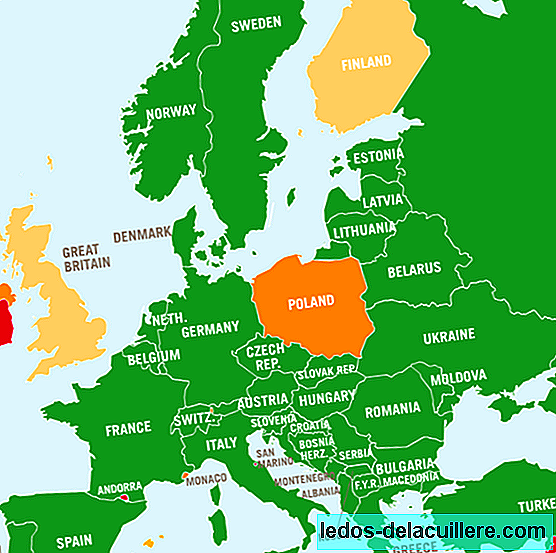Argentina has taken a first step to decriminalize abortion (currently allowed only in case of violation or danger to the health of the mother), and in case the Senate ratifies the bill, the country would join the few countries of Latin America and the Caribbean in which abortion is legal.
In Europe, most countries have permissive legislation regarding early abortion, although there are some exceptions such as Malta or Ireland. Spain, on the other hand, allows free abortion until 14 weeks of gestation, and until 22 if there is a risk to the life or health of the mother, or abnormalities in the fetus.

This map offers a vgeneral view of the situation in Europe in terms of termination of pregnancy. The green colored pages allow abortion if a series of assumptions are given, the orange colored ones only allow it to preserve health, and the red colored ones are the strictest.
Below we offer a more detailed analysis of each country and its specific characteristics.
Croatia, Denmark and Slovenia, first quarter
The current abortion law in Croatia dates back to 1978 and states that the woman can only abort until 10 weeks. Recently, the Constitutional Court of Croatia rejected a request to amend the law.
This same time limit also applies in your neighboring country, Slovenia.
In Denmark it is allowed to freely terminate the pregnancy within the first 12 weeks, counting from the date of the last period. Beyond this period the abortion must be justified by a medical council, and only in case there is physical and mental risk to the mother's health, or risk of illness in the fetus. Abortion is performed in public health and those under 18 need parental consent.
Austria and Sweden, second quarter
In Sweden, the time limit for abortion is 18 weeks, counting from the date of the last period. There the law only allows abortion in the event that the physical and mental health of women is in danger.
In Austria, the law allows women to abort freely until 16 weeks, and no explanation is required to terminate the pregnancy. If there is a medical reason, social security will cover the entire process, but if there is no reason, women must pay for it privately.
United Kingdom and Scotland, long term
British law of 1967 allows abortion until 24 weeks gestation if physical or disability problems are confirmed in the fetus, or there is a risk to the mother's physical or mental health.
The strictest countries
Ireland, Northern Ireland, Malta and Poland they are the strictest countries in terms of termination of pregnancy.
Recently, 66% of Irish people voted yes to reform the abortion law, one of the most restrictive in Europe. In this country, abortion is only allowed in exceptional circumstances if the mother's life is in danger, but does not contemplate cases of incest, rape or malformations of the fetus.
For its part, in Northern Ireland abortion is governed by two laws, of 1861 and 1945, which state that interrupting pregnancy is a crime. There are only two exceptions: if the mother's life is at risk or there is a risk that the woman will suffer physical or psychological problems if she continues with pregnancy.
And as for Malta, it's the the only country in the European Union that prohibits abortion even in case of rape, and defends the baby's life from the first moment of conception. This strict restriction has forced the Council of Europe to intervene, which aims to force the country to legalize abortion.
For its part, Poland allows abortion if the pregnancy is the result of rape or incest, if the woman's life is in danger or in cases of severe or lethal fetal malformation. However, there is a great number of administrative barriers and accessing a safe abortion, even in these cases, is very complicated, according to Amnesty International.
Italy, low abortion rate
Although abortion was decriminalized in Italy 40 years ago, this issue continues to generate much controversy in the country and divide public opinion. Not surprisingly, it is the European country with the lowest abortion rate.
The law allows abortion through public health during the first 90 days of pregnancy if health, economic or family reasons are mentioned. Beyond this time, termination of pregnancy is legal whenever there is any pathology in the fetus or danger to the mother.
However, it is not easy to find gynecologists, anesthetists and nurses who want to perform an abortion because lA conscientious objection is widespread among health professionals.
Other countries with particularities
In Germany it is possible to abort within the first 12 weeks of gestation, counted from the first day of the last menstruation. As of this date, it is also possible to terminate the pregnancy under medical indication, in case of risk to the physical or psychological health of the pregnant woman, or damage to the fetus. In this case there would be no time limit but the law establishes a three day reflection period.
Abortion In France was decriminalized in 1975. It is currently allowed abort freely until 12 weeks. Beyond this date it can be done in case of risk to the mother's health, or if the fetus has a serious illness recognized as incurable. In addition, you must be certified by two doctors and Social Security reimburses 80% of the expenses.
In Belgium, abortion is legal until 14 weeks if there is a risk to the mother's health, if the fetus has a disease "extremely serious and incurable", or if the woman manifests a "state of anguish / crisis". But the law establishes a six-day reflection period and mandatory advice on alternatives to abortion, in addition, a second medical opinion is required in the first two cases.
Finland, various reasons
In Finland, abortion is allowed up to 12 weeks in case of risks to the mother's health or for other reasons such as her age (under 17 years or over 40 years), if the woman already has four or more children, or if there is an inability to take care of the baby because of an illness. You can also mention family, economic, labor or social reasons. Minor women can abort without parental consent.
Beyond this date, it is possible to terminate the pregnancy if the reason is justified, but it must be endorsed by the National Supervisory Authority on Welfare and Health (Valvira).
In Magnet | This is how the yes to the decriminalization of abortion has been lived in Congress and on the streets of Argentina












